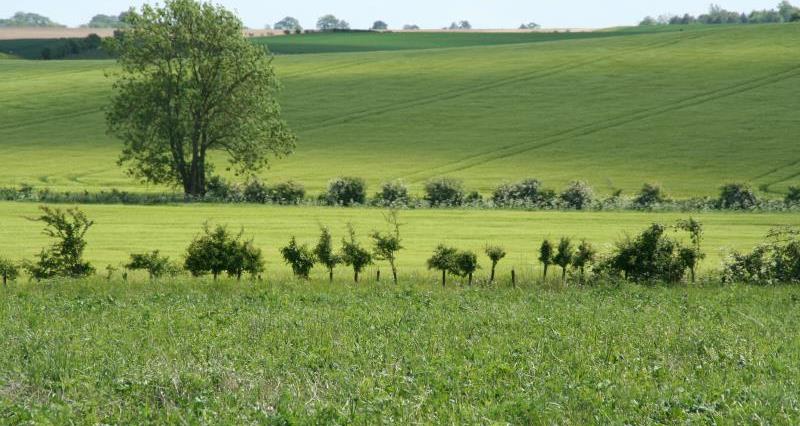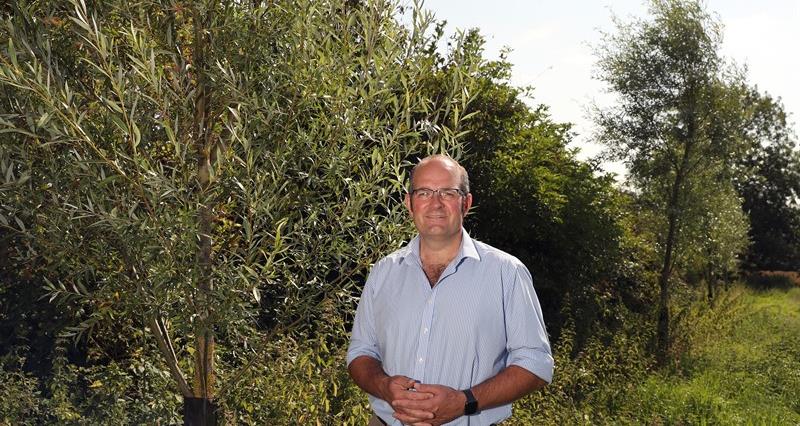Government plans to reach zero emissions by 2050 include some pretty hefty tree-related goals, among them a requirement to treble plantings to 30,000 ha per year by May 2024.
However, as the National Audit Office spending watchdog and MPs on the EFRA Committee have both noted in recent months, UK production of tree seedlings falls short of current needs, let alone the demand forecasted for a net zero future.
Therein, of course, lies an opportunity, and among those recognising the need for a steady supply of home-grown trees is NFU member Richard Shropshire, the director of Woodhall Growers in Staffordshire. And, if it goes well, the project could provide a blueprint for other farms to break into the market.
Farming Innovation Programme
The diversification has won backing under the (FIP) Farming Innovation Programme, a part of the government’s Agricultural Transition Plan that funds R&D as UK agriculture moves away from traditional direct support.
This FIP element has proved crucial, Richard says, not necessarily for the £45,000 of funding (“once it has been distributed amongst various parties there isn’t a lot left”), but for the crucial contacts it has helped to provide with researchers, experts from Innovate UK (the government’s ‘national innovation agency’), and from academia.
That has allowed Richard to test the waters for other growers in a particularly forward-looking way. “The key to the FIP is that it encourages a farmer or grower to find the brainpower to help their business,” Richard says. “You get a fantastic list of innovation managers to choose from, all with a variety of very specific experiences and skills"
“You’re also encouraged to find expertise from a university or other body to help with the project. If you can ensure that the project is ultimately publishable, then you can put together an attractive proposition to some very intelligent people to be part of your team. Also, farmers and growers can come up with the ideas, but we often need help with marketing – anyone with a bit of luck and decent weather can grow it, but can you sell it? Again, the programme is designed to encourage you to find the individuals to help with markets and making the much-needed sales.”
The project
Richard hopes to assess different measures of success in the production of tree and hedge seedlings in the UK.
With many of the pesticides previously used in the tree seedling production no longer available, these will be grown to organic standards, an area in which Woodhall Growers has considerable experience in the wider business.
The project will study factors affecting germination, plant health and yield, alongside an economic analysis of the organic tree nursery market, and the hope is that this research will be used to demonstrate the commercial opportunities to other farmers.
“The key to the Farming Innovation Programme is that it encourages a farmer/grower to find the brainpower to help their business.”
NFU Member Richard Shropshire
“We are hoping that the tree and hedging trial will not only help our own farming business, but also report back a cropping opportunity that can be replicated by other growers,” says Richard.
The tech
To further align the business with the drive towards net zero, Richard is minimising the amount of diesel used in the development and the running of the nursery and will use a solar and battery-powered field robot, FarmDroid, for seeding and weed control. He adds: “I thought that, seeing as we’re trying to establish a tree and hedge nursery at field scale under organic standards, we might as well make life really tricky for ourselves and see if we can use as little diesel as possible, hence choosing a robotic solution that uses solar and battery as the power source.
“We’ve gone with FarmDroid because our dealer, Agri-Droid UK Ltd, are organic farmers based not too far away from us, near Shrewsbury. Being organic farmers themselves, they really appreciate the problems that growers encounter and are continually coming up with practical solutions.”
He adds: “We couldn’t afford to invest in the robotic system unless we had an existing vegetable and salad business on which to run it. We’re growing beetroot and onions with the FarmDroid and there is just enough time to incorporate it into the one-hectare area for this project without affecting our core business.”
With the prospect of a offering a valuable diversification that supports a food-producing farm business, and one that contributes to a growing climate change mitigation market, the project appears to tick all the boxes. The proof there will be realised in the coming few years, with planting underway at the time of writing.
Find out more about FIP grants.



